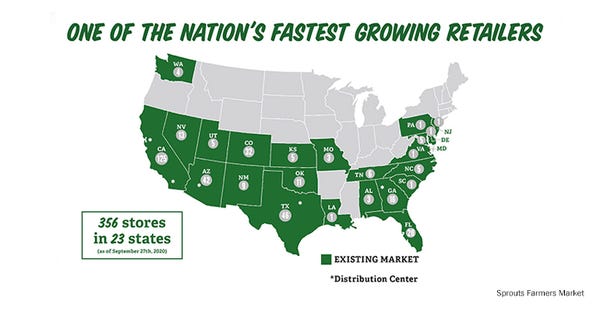Sprouts Farmers Market reports net sales increase continued in Q3
Net income more than doubles compared to a year ago; CEO credits pandemic, strategy and healthy offerings.

Sprouts Farmers Market reported a 9.5% increase in Q3 sale compared to a year ago, with sales reaching $1.6 billion.
"As we started 2020, we were focused on executing on our five-year strategy of creating a highly profitable, differentiated, speciality grocer with a long growth runway. Overall, the COVID environment has allowed us to fast-forward certain aspects of our strategic plan, which has provided many financial benefits," Jack Sinclair, chief executive officer of Sprouts Farmers Market, said during the earnings call on Wednesday afternoon.
"I'm pleased with how far we have come," Sinclair said, thanking the company's employees for their extra work and care during the COVID-19 pandemic. The third quarter ended Sept. 27.
Net sales growth was driven by continued demand from the COVID-19 pandemic, contributing to a 4.2% increase in comparable store sales and strong performance in new stores opened.
During the third quarter, profit, income and earnings per share also increased significantly:
Gross profit for the quarter increased 23% to $585 million, resulting in a gross profit margin of 37.1%, an increase of 400 basis points compared to the same period in 2019.
Net income for the quarter was $60 million, compared with $26 million a year ago.
Adjusted net income was $62 million, compared with $26 million a year ago.
Adjusted earnings before interest and taxes were up $81 million or 104%.
Diluted earnings per share was $0.51, compared with $0.22 in 2019.
Adjusted diluted EPS was $0.52, up from $0.22 a year ago.
Comparable-store sales increased 4.2%; two-year comparable-store sales grew 5.7%.
Chief Financial Officer Denise Paulonis noted that Sprouts offered many discounted prices in 2019 that it did not offer this year. Promotions were heavier in August and September than they had been in July of last year, she said.
"Our data shows that purchases from highly price-sensitive shoppers who hunted for deals on our print ads slowed during the quarter as we continued to shift our marketing strategy to target customers with greater interest in assortment," Paulonis said.

Strategically moving forward
Sinclair discussed the company's progress on three key strategies: innovation, marketing and e-commerce.
Innovation in non-perishable and frozen foods are resonating with customers, he said. Comparable sales in those categories exceed the stores' averages. Sprouts has launched more than 3,500 new products, including seasonal Hatch chili items, Sprouts vegan protein powder, cold-brew coffee with MCT oil and different keto, plant-based, private-label offerings.
"These unique categories are targeted to our customer base," Sinclair said. The Sprouts team is looking at all product categories, examining the product pipeline and making sure new, innovative offerings will be available in every department.
In August, the company launched a new logo and branding: Sprouts, Where Goodness Grows. The campaign highlights produce, "the heart of our store," Sinclair said, to drive home the farmers market experience.
"Brand-building takes time, but our digital impressions have been impressive, with more than 1.4 billion impressions of our master brand since its launch and over 2 billion media impressions, as we extend our reach with our target customer groups: the health enthusiast and the experience seeker," he said.
Switching to digital advertising from print flyers has proven efficient, as well. The company confirms 17 million views of the digital version, while it had been printing 21 million copies, he said.
"Additionally, we are leveraging the flexibility of digital communications to make our customers aware of what is new and different in our stores," Sinclair said. The company will increase its use of digital communications in the future, he added.
Sprouts' pricing strategy has been beneficial, as well. "From a pricing standpoint, we have a better balance of more every day accessible prices and fewer ad items," even in the produce department, Sinclair said.
"We're in the early stages of brand development but I'm please with the initial response. The opportunity lies with us to properly communicate and grow our target customers and their baskets over time," Sinclair said.
E-commerce was a huge growth area for Sprouts in the company's second quarter and probably in the third, as well, the CEO said.
"It is more important than ever to have a full omni-channel offering, as many customer use both in store and online for their grocery needs. They complement each other," Sinclair said.
In addition to delivery, Sprouts began offering curbside pickup through the website and the app. Unlike when a customer orders delivery via Instacart, pickup orders allow customers to apply digital coupons and see their order history. At the same time, Sprouts retains customer data on those orders.
The company opened six stores during the third quarter; it had 356 stores in 23 states at the end of the quarter.
Looking ahead and into the new year
One customer behavior change, trip consolidation, doesn't seem to benefit Sprouts as it does conventional grocers, though. Poulonis pointed out that Sprouts doesn't have a large selection of paper goods and cleaning supplies.
Despite that, she said, "We're confident that our strategic actions will result in a long runway of profitable sales growth."
For the fourth quarter, Sprouts expects comparable store sales to be in the low single digits and, inclusive of the 53rd week, adjusted diluted EPS to be between $0.36 to $0.40, which translates into a full-year adjusted diluted EPS range of $2.26 to $2.30, on a 53-week basis.
The company expects earnings before interest and taxes in 2021 will be between $285 to $305 million.
About the Author(s)
You May Also Like




